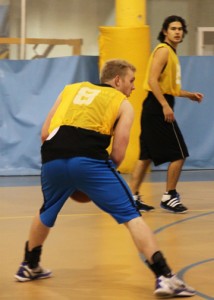 What thoughts come to mind when I mention college intramural sports?
What thoughts come to mind when I mention college intramural sports?
I am sure that most of you would say that intramural sports are for the scrubs or the wannabes. Others may also argue that intramural sports lack the competitive nature and consistent training that most college and professional sports have. However, I can contend for the opposite to be true. During my college intramural sports career thus far, I have watched and competed against several intramural athletes that are not the typical wannabes or scrubs that most would think.
The truth of the matter is that intramural sports can get quite competitive although they are created for “fun”, and it is in the spirit of this unlikely, intense competition that diamonds in the rough are discovered. I have experienced the intensity and competition in intramural sports both by playing against very good athletes and watching a number of games. The intramural sport in which I have observed the greatest competition and best athletes is basketball. There is no doubt in my mind that the best athletes in the intramural basketball league at my university could have competed at legitimate D-1 or D-2 colleges.
Now, you may be wondering why these athletes are so good. Believe me…I have wondered the same thing for quite a while. Then, one day, I was having a conversation with one of my good friends, who also happens to be one of the best players in the intramural league, and the answer dawned on me. The key to their superior skill and success in intramural sports lies within their mentality during their boredom. Think about it. If you love playing basketball, are bored, and have free time, what would you most likely do? You would either go to the gym to shoot around for countless hours, or you would daydream about playing basketball.
While practice does make perfect, as far as physically training for a sport is concerned, it is important to recognize what is going on behind the scenes—the daydreams. The action of daydreaming activates a mental technique known as employing imagery. Imagery is a great technique, which, if used correctly, can definitely help an athlete in improving their game. In fact, a study by Guillot, Collet, and Dittmar (2004) conducted research on this topic in terms of visual and kinesthetic imagery. This study confirmed that employing the appropriate imagery will better prepare an athlete for game-time situations. When an athlete is prepared for different situations, they will be able to operate more successfully in a game-time environment.
Although intramural basketball players may not have proper training in the techniques of imagery, they may still be the best in developing game-time imagery. Basketball players seem to have this natural tendency to imagine different scenarios, which could potentially occur during a game. These images allow basketball players to go through the motions of a game before they compete in one. When this predisposition towards imagery is combined with the passion, boredom and free time of an intramural basketball player, it creates the opportunity for that player to become the best at what they do.
Reference:
Guillot, A., Collet, C., & Dittmar, A. (2004). Relationship between visual and kinesthetic
imagery, field dependence-independence, and complex motor skills. Journal of
Psychophysiology, 18, 190-198.

























